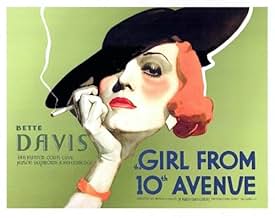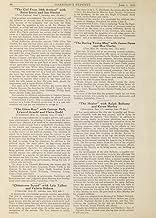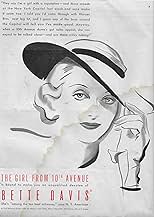IMDb-BEWERTUNG
6,7/10
1458
IHRE BEWERTUNG
Füge eine Handlung in deiner Sprache hinzuA lawyer impulsively marries a stranger after his fiancée dumps him.A lawyer impulsively marries a stranger after his fiancée dumps him.A lawyer impulsively marries a stranger after his fiancée dumps him.
- Auszeichnungen
- 1 wins total
Bill Elliott
- James
- (as Gordon Elliott)
André Cheron
- Max
- (as Andre Cheron)
Vesey O'Davoren
- Servant
- (Gelöschte Szenen)
Sam Ash
- College Club Guest Outside Bar
- (Nicht genannt)
Brooks Benedict
- Waldorf Diner
- (Nicht genannt)
Davison Clark
- Detective #2
- (Nicht genannt)
Heinie Conklin
- Waiter at Marchand's
- (Nicht genannt)
James Donlan
- First Detective
- (Nicht genannt)
Empfohlene Bewertungen
She had no sex appeal and was as interesting to watch as paint drying on a winter's day. This is just the opinion of Universal International. Warner Brothers and RKO saw her differently because she garnered academy awards for them.
Katherine Alexander throws over wealthy Ian Hunter to marry richer Colin Clive, so Hunter goes on a pub crawl. Poor but honest Bette Davis goes on the toot with him to see how the better half drink and winds up married to him. She offers him back the ring and the marriage contract, but they decide to keep it going until he's done with her. After nearly a year, with her studying how the upper crust behave under the tutelage of ex-Floradora girl Alison Skipworth, Miss Alexander pushes her husband out and goes after Hunter.... and Miss Davis retaliates.
It's the sort of foolish role that Warner Brothers put Miss Davis in, which she handles in a straightforward and honest manner. Interestingly, two movies later, she would win an Oscar under the same director, Alfred Green.
The script obviously had something to say about the way men and men use each other, but that's lost in the final cut. Certainly, the cavalier manner in which everyone treats manner is a bit of a surprise under the Code.
Ian Hunter was one of those large, good-looking, competent actors, best remembered by playing Richard the Lion-heart and the only one of Jessie Matthews' leading men who didn't seem afraid of women. Born in 1900, he appeared in about ten silent films, played some leads in British films, then moved to the United States for a long stretch. He made his last movies in Italy in 1963 and died a dozen years later.
It's the sort of foolish role that Warner Brothers put Miss Davis in, which she handles in a straightforward and honest manner. Interestingly, two movies later, she would win an Oscar under the same director, Alfred Green.
The script obviously had something to say about the way men and men use each other, but that's lost in the final cut. Certainly, the cavalier manner in which everyone treats manner is a bit of a surprise under the Code.
Ian Hunter was one of those large, good-looking, competent actors, best remembered by playing Richard the Lion-heart and the only one of Jessie Matthews' leading men who didn't seem afraid of women. Born in 1900, he appeared in about ten silent films, played some leads in British films, then moved to the United States for a long stretch. He made his last movies in Italy in 1963 and died a dozen years later.
Based on the play "Outcast" (from 1914, no less!), The Girl From Tenth Avenue opens by showing us a wedding invitation, and two gentlemen of the wedding party driving towards the ceremony. Then we see Miriam Brady (Bette Davis) and Geoffrey Sherwood (Ian Hunter) standing on a street corner, listening to the wedding that is taking place. Sherwood is drunk, and Miriam decides to take a personal interest in getting him into a restaurant, away from the wedding scene. Although WHY she does, isn't really explained... Davis had just made "Of Human Bondage", and was about to win the Oscar for "Dangerous"... good year for her! Viewers will recognize the landlord Mrs. Martin, played by Alison Skipworth; she made FOUR films with W.C. Fields. Next thing you know, Miriam and Geoffrey are married, apparently skipping a couple of the 12 steps Sherwood SHOULD be going through. There is a lot of talking in this story, as with most plays. It starts pretty slow, but picks up about halfway through. I wonder if this would have been a little more spicy if it hadn't been made right as the Hays Code was starting to be enforced. Davis and Hunter would make five films together in the 1930s.
The Girl From 10th Avenue is one of those B programmers that the brothers Warner were throwing Bette Davis into before they realized what a talent they had. She had already done and got rave reviews for Of Human Bondage, but it made not a whiff of difference. She was a few films from her consolation Oscar for Dangerous.
When Davis got films really beneath her she just went full blown Bette with the voice and the mannerisms that impressionists made a living on for decades. In this film she's a shopgirl who lives in Hell's Kitchen on 10th Avenue who happens to aid a 5th Avenue playboy Ian Hunter when he's been out on a toot. The two wind up married. But can they make a go of it and can Bette fit in with the society just five city blocks from her roots.
This was another Depression Era plot, the shopgirl who marries well and tries to make a go of it. Joan Crawford over at MGM was well known for these roles, though the best of them was the gold digging Crystal in The Women. Davis has to deal with Katharine Alexander who Hunter had broken off with and Hunter has Alexander's ex-husband Colin Clive as a confidante.
Who really scores well is Alison Skipworth who back in the day was a Floradora girl who made a society catch of her own. Skipworth shows Davis the ropes in her own inimitable style.
The Girl From 10th Avenue gets a couple of notches higher rating simply because Davis pushes it up.
When Davis got films really beneath her she just went full blown Bette with the voice and the mannerisms that impressionists made a living on for decades. In this film she's a shopgirl who lives in Hell's Kitchen on 10th Avenue who happens to aid a 5th Avenue playboy Ian Hunter when he's been out on a toot. The two wind up married. But can they make a go of it and can Bette fit in with the society just five city blocks from her roots.
This was another Depression Era plot, the shopgirl who marries well and tries to make a go of it. Joan Crawford over at MGM was well known for these roles, though the best of them was the gold digging Crystal in The Women. Davis has to deal with Katharine Alexander who Hunter had broken off with and Hunter has Alexander's ex-husband Colin Clive as a confidante.
Who really scores well is Alison Skipworth who back in the day was a Floradora girl who made a society catch of her own. Skipworth shows Davis the ropes in her own inimitable style.
The Girl From 10th Avenue gets a couple of notches higher rating simply because Davis pushes it up.
Knew from reading 'The Girl from Tenth Avenue's' plot synopsis to not expect too much from the story, which in feel is not much different from a lot of other films at that time. Where more often than not one had to suspend disbelief and not watch looking for sense. Bette Davis has done many fine performances and seldom less than watchable (depending on the material of course, with her being unable to do anything good with the bad material in 'Wicked Stepmother' and 'Bunny O Hare'.
Also like what (not enough) has been seen of Alfred E Green's work, prime examples being 'Baby Face' and 'Dangerous', the latter also starring Davis and earned her her first Oscar win (while extremely good in that film quite a number of her other performances were more deserving). Colin Clive's life and career were too short, but he was watchable too and still love the two 'Frankenstein' films he starred in. Seeing 'The Girl from Tenth Avenue' a while back, to me it was good fun and an inoffensive way to spend just a little over an hour but didn't fit my definition of being a great film.
'The Girl from Tenth Avenue' is not one of those films that compels from the get go. It instead takes time to settle and find its footing, starting off a little too slow and having too much of a confined and stage origins feel. Most of the characters are sketchily developed and gives some of the cast too little to do. The cast mostly do a good job though and make the most of what they have to work with, but this was very much a Davis vehicle and it does show a bit in how the characters are written and how much screen time they have. Ian Hunter however doesn't have an awful lot of presence apart from towards the end during his big scene with Davis.
Have said already about not trying to expect too much from the story, and still stand by that with some of it being predictable and quite silly. Especially in the first half. If that is something that has been a common criticism in my recent reviews it is because it was a common factor for films during this period, so reinforcing is inevitable.
Like has been said though, 'The Girl from Tenth Avenue' is not a film to switch off and dismiss prematurely. It really does get better, more gripping and one is rewarded enough when sticking with it. Davis gives a great full throttle performance and of the rest of the performances Alison Skipworth shines the most and on sparkling form. Katherine Alexander also has one of the film's best scenes and Clive brings dignity to an underused role. Green's direction is mostly smart and keeps the high emotions of the drama in the latter stages gripping.
Much of the script is snappy and thoughtfully written, not rambling too much and it doesn't get verbose. It does get over-heated at times but not in a way that's unbearable. The second half of 'The Girl from Tenth Avenue' has plenty of moments of tension and poignancy, especially towards the end with two scenes (aforementioned) that particularly blister, much of it down to Davis being so good. It is well shot and doesn't look cheap.
In summary, not a great film but passes the time more than adequately. 7/10
Also like what (not enough) has been seen of Alfred E Green's work, prime examples being 'Baby Face' and 'Dangerous', the latter also starring Davis and earned her her first Oscar win (while extremely good in that film quite a number of her other performances were more deserving). Colin Clive's life and career were too short, but he was watchable too and still love the two 'Frankenstein' films he starred in. Seeing 'The Girl from Tenth Avenue' a while back, to me it was good fun and an inoffensive way to spend just a little over an hour but didn't fit my definition of being a great film.
'The Girl from Tenth Avenue' is not one of those films that compels from the get go. It instead takes time to settle and find its footing, starting off a little too slow and having too much of a confined and stage origins feel. Most of the characters are sketchily developed and gives some of the cast too little to do. The cast mostly do a good job though and make the most of what they have to work with, but this was very much a Davis vehicle and it does show a bit in how the characters are written and how much screen time they have. Ian Hunter however doesn't have an awful lot of presence apart from towards the end during his big scene with Davis.
Have said already about not trying to expect too much from the story, and still stand by that with some of it being predictable and quite silly. Especially in the first half. If that is something that has been a common criticism in my recent reviews it is because it was a common factor for films during this period, so reinforcing is inevitable.
Like has been said though, 'The Girl from Tenth Avenue' is not a film to switch off and dismiss prematurely. It really does get better, more gripping and one is rewarded enough when sticking with it. Davis gives a great full throttle performance and of the rest of the performances Alison Skipworth shines the most and on sparkling form. Katherine Alexander also has one of the film's best scenes and Clive brings dignity to an underused role. Green's direction is mostly smart and keeps the high emotions of the drama in the latter stages gripping.
Much of the script is snappy and thoughtfully written, not rambling too much and it doesn't get verbose. It does get over-heated at times but not in a way that's unbearable. The second half of 'The Girl from Tenth Avenue' has plenty of moments of tension and poignancy, especially towards the end with two scenes (aforementioned) that particularly blister, much of it down to Davis being so good. It is well shot and doesn't look cheap.
In summary, not a great film but passes the time more than adequately. 7/10
Wusstest du schon
- WissenswertesThe original play opened in New York on 2 November 1914.
- PatzerWhile drinking with John at the College Club, Geoffrey fills his glass in three successive shots without drinking the previous contents.
- Zitate
Geoffrey Sherwood: Now I'm in oil.
Hugh Brown: So is a sardine.
- VerbindungenReferenced in Zwei nette Dicke (1981)
- SoundtracksBridal Chorus
(uncredited)
from "Lohengrin"
Music by Richard Wagner (1850)
Played on an organ before the wedding
Top-Auswahl
Melde dich zum Bewerten an und greife auf die Watchlist für personalisierte Empfehlungen zu.
Details
- Erscheinungsdatum
- Herkunftsland
- Sprachen
- Auch bekannt als
- Men on Her Mind
- Drehorte
- Produktionsfirma
- Weitere beteiligte Unternehmen bei IMDbPro anzeigen
- Laufzeit1 Stunde 9 Minuten
- Farbe
- Sound-Mix
- Seitenverhältnis
- 1.37 : 1
Zu dieser Seite beitragen
Bearbeitung vorschlagen oder fehlenden Inhalt hinzufügen

Oberste Lücke
By what name was The Girl from 10th Avenue (1935) officially released in Canada in English?
Antwort



































